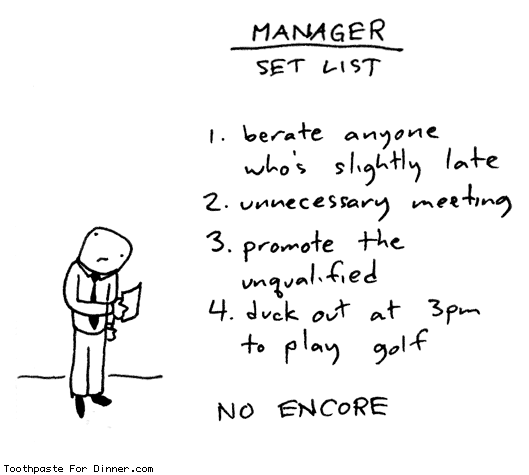Growing up, I was never a great leader of people. I was perfectly content to work by myself, off in a corner, not depending on anyone, not having to really be interdependent on anyone else, and I was CERTAINLY not the one bossing people around.

However, by some strange twist of fate – I’m boss lady. Have been on and off for the larger part of the last decade in some capacity. I used to think that if I could do it, anyone could, but I’ve been party to enough spectacular failures now that it’s not the case. So, I’ve been thinking on what makes a team and a manager succeed, and what I strive for, and thus, the list below has come into existence.
1. If you don’t trust your team, you’ll never be able to trust your team. That is; if you don’t give people enough freedom to go out and make mistakes and learn from them, and know that you still have their back, you’re going to have a lot of issues. First, you don’t trust them, they won’t trust you, and honesty is important. Second, once people realize they’re trusted and valued, they’ll be very self accountable. Third, it’s nice to feel like an adult at work and not have every little action you make under scrutiny, and be trusted to do your job.
2. You should be able to be candid, open, honest, and even bitchy with your direct supervisor. You need an outlet that can go slightly up the chain so that it can potentially make a difference (rather than bitching to your peers which just fosters negativity without effect). These conversations should result in something positive, even if that positive is just releasing stress on a bad day and agreeing to revisit later.
3. You need to strike a balance between “damn the man” and “company yes man”. While it’s bad form to talk too much smack about the people over you and not respect the folks in charge, you also need to not kiss their asses to your team. There is no reason not to kiss your employees asses in front of your supervisor if they’re doing a great job though.
4. You don’t get to control everything. You get to control the important things. You don’t get to affect every detail unless you want to be really really overworked and bad at your job as a manager. Let the little things that don’t matter go.
5. Teach your subordinates to think enough like you so you can trust them to make good decisions, but encourage the differences that foster creativity and bringing unique things to the table. I don’t want a bunch of mini-me subordinates running around, but I do want them to know a good decision from a bad decision in the context of the project and the team.
6. It should never, ever, ever be a crime to disagree with someone, as long as it’s done respectfully and calmly. No one’s word is the “word of god”. Heck, I would think that the big guy up there would want someone to question him if he was about to do something stupid. Sometimes the answer is “it is the way it is”, but the more information about the decision and the circumstances around it you can give to someone, the less they’ll feel as if you’re brushing them off and being asked to obey without question.
7. Stressed out face should be reserved for appropriate emergencies. If there is more than one of these a month, either you’re making way too big a deal out of things and need to re-prioritize, or you have broken processes that need to be fixed.
8. The first answer to a resource problem shouldn’t be “work harder” or “work longer”. There’s usually a more optimal solution than that (simplify design, ask for help, cut the unneeded features, find other options, etc). However, sometimes it is just that, and in those situations, you should never, ever take for granted that those people are in the office working when they could be doing something else. You should hope that if you DO need to be all in, it’s because the team has buy in that it’s necessary to make a superior production, and not simply because of poor planning, feature creep, or emergent crap that could have been found sooner. Above all else, extended hours is a problem that should be resolved as quickly as possible.
9. Sometimes putting key people in a room with no agenda is good thing. We do this once every two weeks for an hour for the last few years, and I’ve never once felt like it’s been a waste of time.
10. Productivity isn’t always as it seems. If someone is surfing facebook or chatting in the breakroom or taking breaks, it doesn’t necessarily mean they’re slacking. Some people are built different – instead of a solid 8 hours of working, they’ll sprint for a few hours, and then need a break. You can’t take away the break, or you don’t get the sprint. As long as shit is getting done on time, and they’re not keeping other people from doing their work, it’s fine. You’re not going to get more work out of these people by forcing a strict 8 hours of desk time sans facebook, as they’ll just work slower (aka – normal people speed).
11. Not every employee needs the same thing from you. I’m not saying that you should treat people unequally, but some people need explanations, some people need humor, some would rather keep it 100% professional. Some people want attention, and some people want to see you as little as possible. Some people like to be talked to face to face, some people like email, IM, etc. The more flexible you can be with your communication, and the more you can adapt to your employees’ communication style rather than forcing yours on them, the more comfortable your team will be talking to you.
When it comes down to it, this is all really about respect. If you respect your team’s expertise, respect their different workstyles, and respect their different viewpoints, and just overall treat your reports as human beings no matter how frustrated or how stressed you are, or how impending a deadline is. I am not perfect, but I can at least say this list is something I strive to embody every day.
As a manager, I care about two things above all else. #1 and #2 are both the most important – a high quality, fun product (I make games, fun is important), and a happy, thriving team. Long term, you can’t really have one without the other. Nurturing your team means awesome stuff means profit!




Comments are closed.